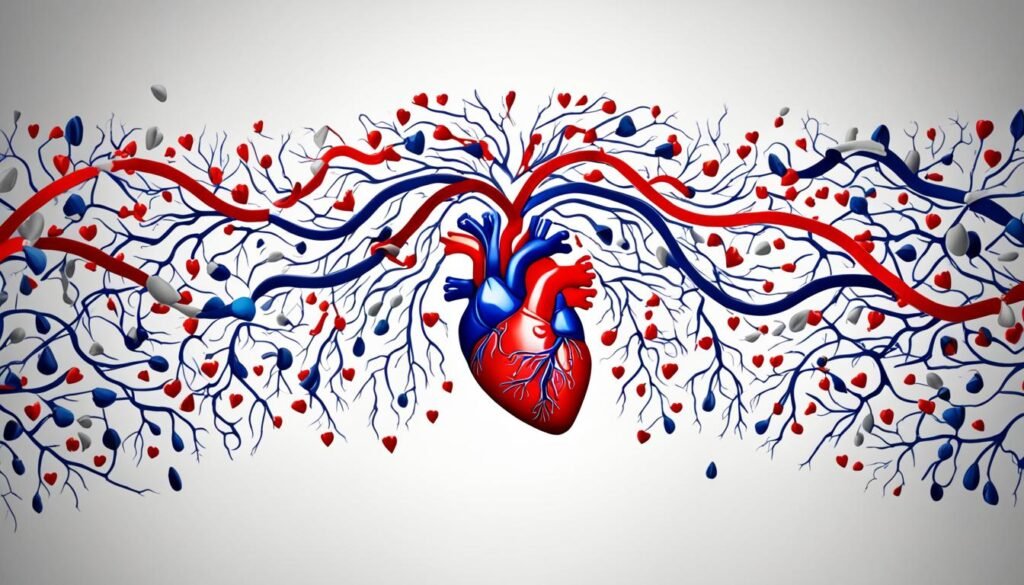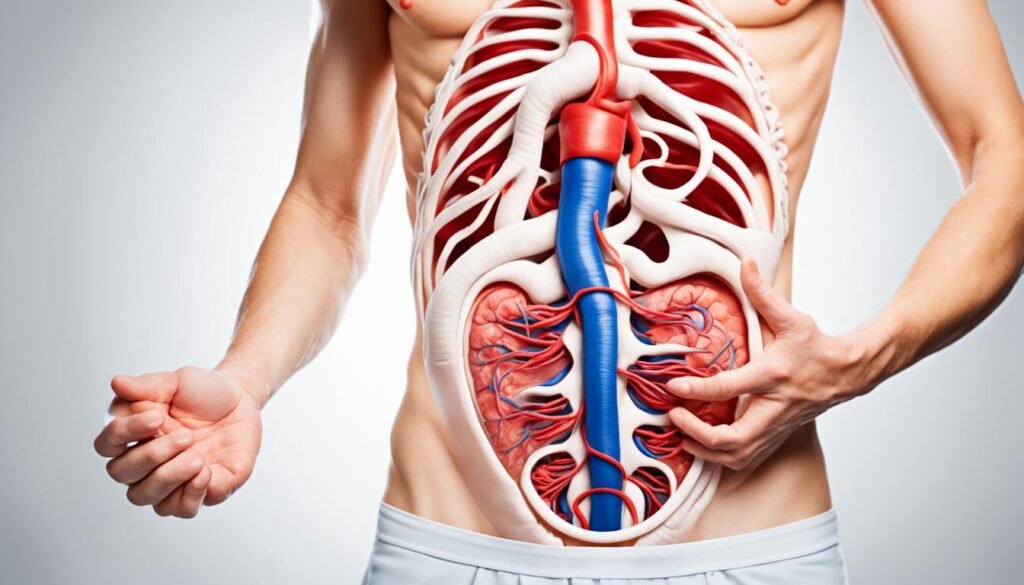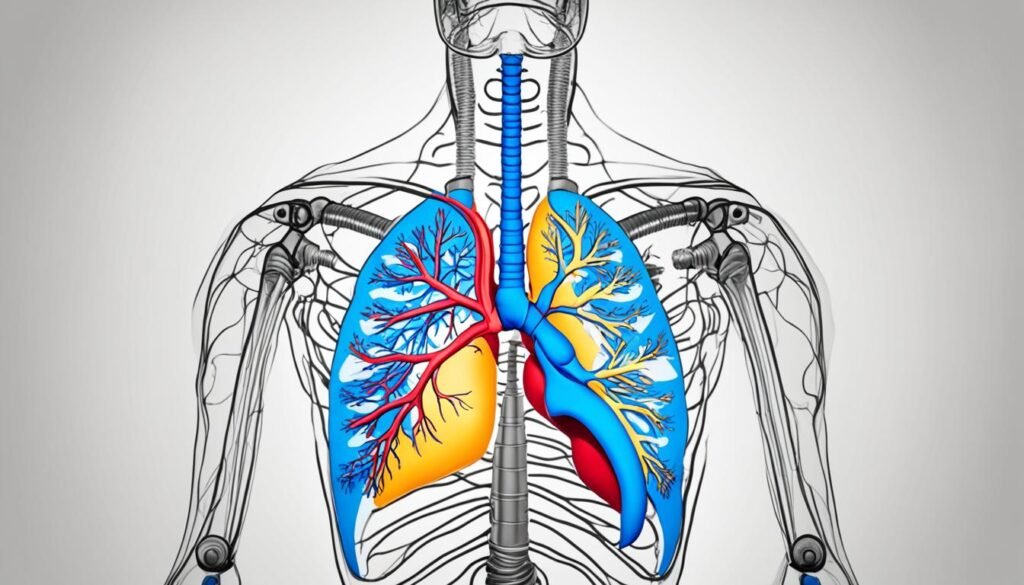Anxiety is a common experience for many people, but chronic anxiety can have a profound impact on the body. It can affect various systems, including the nervous, cardiovascular, digestive, immune, and respiratory systems. Understanding the physical symptoms of anxiety and its effects on the body is essential for managing this condition.
Key Takeaways : Anxiety On The Body
- Anxiety disorders can lead to chronic anxiety and interfere with daily functioning.
- Physical symptoms of anxiety include rapid breathing, rapid heart rate, abdominal pain, indigestion, chest pain, fatigue, insomnia, and headaches.
- Anxiety can impact the central nervous system, cardiovascular system, digestive system, immune system, and respiratory system.
- Treatment options for anxiety include medication, therapy, and lifestyle changes.
- Managing anxiety can improve overall well-being and minimize the long-term effects on health.
The Impact on the Central Nervous System
Anxiety and panic attacks can have a profound impact on the central nervous system. When experiencing anxiety, the brain releases stress hormones such as cortisol, which can affect the functioning of the nervous system. This can lead to a range of symptoms including headaches, dizziness, and depression.
Long-term exposure to stress hormones can also contribute to weight gain and disrupt the body’s natural balance. The central nervous system plays a crucial role in regulating emotions, cognition, and behavior, making it susceptible to the effects of anxiety and panic attacks.
“When stress hormones flood the body during anxiety and panic attacks, it can feel overwhelming and paralyzing. These hormones can disrupt normal brain functions and contribute to the development of anxiety disorders.”
Fortunately, there are effective treatment options available to individuals struggling with anxiety disorders. Cognitive-behavioral therapy (CBT) is a widely used approach that focuses on identifying and changing negative thought patterns and behaviors associated with anxiety. CBT equips individuals with practical tools to manage their symptoms, reduce the impact on the central nervous system, and regain control over their lives.
In addition to therapy, lifestyle changes such as regular exercise, practicing stress reduction techniques, and maintaining a healthy diet can also support the central nervous system and promote overall well-being.
Cognitive Behavioral Therapy and its Benefits
Cognitive-behavioral therapy (CBT) is a validated treatment option for anxiety disorders. It helps individuals understand the connection between their thoughts, emotions, and behaviors and empowers them to develop healthier coping strategies.
The positive benefits of CBT on the central nervous system are vast. Research shows that CBT can lead to long-lasting changes in brain activity, reducing anxiety symptoms and improving overall mental health.
- CBT helps individuals recognize and challenge negative thought patterns that contribute to anxiety.
- It teaches practical skills for managing anxiety, such as relaxation techniques and problem-solving strategies.
- CBT promotes gradual exposure to feared situations, helping individuals overcome their fears and reduce panic attacks.
In combination with medication, if necessary, cognitive-behavioral therapy can provide individuals with the tools they need to effectively manage their anxiety and minimize its impact on the central nervous system.
| Cognitive-Behavioral Therapy | Benefits |
|---|---|
| 1. Identifies and challenges negative thought patterns | Decreases anxiety symptoms |
| 2. Teaches practical skills for managing anxiety | Improves overall mental health |
| 3. Promotes gradual exposure to feared situations | Reduces panic attacks |
Effects on the Cardiovascular System
Anxiety disorders can have a significant impact on the cardiovascular system, leading to various symptoms and potential health risks. The cardiovascular system, which includes the heart and blood vessels, plays a crucial role in maintaining overall health and well-being. When anxiety arises, it can trigger physiological responses that affect this system.
One of the primary effects of anxiety on the cardiovascular system is an increase in heart rate. As anxiety levels rise, the body responds by releasing stress hormones, such as adrenaline, which can cause the heart to beat faster than normal. This rapid heart rate, known as tachycardia, can be uncomfortable and alarming for individuals experiencing anxiety.

In addition to a rapid heart rate, anxiety can also lead to palpitations, which are irregular or rapid heartbeats that can be felt as fluttering or pounding sensations in the chest. These palpitations can further increase stress levels and intensify anxiety symptoms.
Another significant concern related to the cardiovascular system and anxiety is the potential for high blood pressure. Prolonged anxiety and stress can cause blood vessels to constrict, resulting in increased blood pressure. This increased pressure can strain the cardiovascular system and potentially lead to heart disease if left unaddressed.
Individuals with pre-existing heart conditions may be particularly vulnerable to the effects of anxiety on the cardiovascular system. Anxiety can worsen symptoms and potentially exacerbate the underlying heart disease. Therefore, it is crucial for individuals with both anxiety and heart conditions to receive comprehensive medical care and a tailored treatment plan.
Anxiety medication can be prescribed to help manage cardiovascular symptoms associated with anxiety disorders. These medications aim to reduce anxiety levels, calm the nervous system, and regulate heart rate and blood pressure. It is essential to work closely with a healthcare professional to determine the most suitable medication and dosage for individual needs.
Potential Effects of Anxiety on the Cardiovascular System
| Symptoms | Effects |
|---|---|
| Rapid heart rate (tachycardia) | Increased heart rate due to anxiety-induced stress hormones |
| Palpitations | Irregular or rapid heartbeats that can intensify anxiety symptoms |
| High blood pressure | Constriction of blood vessels leading to increased blood pressure |
| Increased risk of heart disease | Long-term anxiety can strain the cardiovascular system and contribute to heart disease |
| Impact on pre-existing heart conditions | Increased symptoms and potential exacerbation of underlying heart disease |
Addressing anxiety and its impact on the cardiovascular system is crucial for maintaining overall health and well-being. Along with medication, therapy and lifestyle changes can also play significant roles in managing anxiety. Techniques such as deep breathing exercises, meditation, and regular physical activity can help reduce stress levels and promote cardiovascular health. Additionally, counseling and cognitive-behavioral therapy can provide valuable tools and strategies for managing anxiety and its effects on the body.
Impact on the Digestive System
Anxiety can have a significant impact on the digestive system, causing discomfort and disrupting normal functions. Many individuals with anxiety experience symptoms such as stomachaches, nausea, diarrhea, and loss of appetite.
Chronic anxiety can also contribute to the development of irritable bowel syndrome (IBS) following a bowel infection. In fact, there is a strong connection between anxiety disorders and the onset of IBS. This condition results in abdominal pain, changes in bowel movements, and overall digestive distress. Individuals with chronic anxiety may experience more severe digestive issues due to the constant presence of stress in their lives.
“Anxiety can manifest in various ways, and one of the most common manifestations is through gastrointestinal symptoms. The brain and the gut have a complex relationship, and anxiety can disrupt this delicate balance, leading to digestive discomfort and dysfunction.” – Dr. Emma Smith, Gastroenterologist
When anxiety triggers the body’s stress response, it can disrupt the normal functioning of the digestive system. The production of stress hormones can lead to increased sensitivity in the gut and altered gut motility, resulting in diarrhea or constipation. These symptoms can further fuel anxiety, creating a cycle of stress and digestive problems.
Managing anxiety and its effects on the digestive system requires a holistic approach. Cognitive-behavioral therapy (CBT) can help individuals identify and challenge anxious thoughts and behaviors, reducing overall anxiety levels and their impact on the digestive system. Additionally, lifestyle changes such as regular exercise, stress reduction techniques, and a balanced diet can support a healthy digestive system and minimize symptoms.

Effects on the Immune System
Anxiety triggers the body’s stress response, which can have significant effects on the immune system. In the short term, anxiety actually boosts the immune system’s responses, preparing the body to fight off potential threats. This is known as the “fight-or-flight” response, where the immune system releases inflammatory chemicals to facilitate quick healing in case of injury or infection.
However, chronic anxiety and stress can weaken the immune system over time. This occurs because prolonged stress leads to the release of stress hormones, such as cortisol, which can impair the body’s natural immune response. The immune system becomes less efficient at identifying and attacking pathogens, making individuals more vulnerable to infections.
Chronic anxiety can also contribute to a weakened immune system by suppressing the production of immune cells and reducing their ability to function optimally. This can result in a decreased ability to fight off viruses, bacteria, and other pathogens, leading to more frequent illnesses and a longer duration of recovery.
Moreover, the constant activation of the stress response due to chronic anxiety can compromise the body’s ability to regulate inflammation. This can lead to chronic low-grade inflammation, which is associated with a range of health problems, including autoimmune disorders and chronic diseases.
The Link between Chronic Anxiety and Vulnerability to Infections
Research has demonstrated that chronic anxiety and stress can increase an individual’s susceptibility to infections. Studies have found that people experiencing chronic anxiety are more likely to develop respiratory infections, such as the common cold, influenza, and bronchitis. Additionally, chronic anxiety has been linked to an increased risk of gastrointestinal infections and urinary tract infections.
The weakened immune system resulting from chronic anxiety can also prolong the duration of infections and lead to more severe symptoms. This can further impact a person’s overall health and well-being, as frequent illnesses can disrupt daily activities and negatively affect quality of life.
Chronic anxiety triggers the release of stress hormones that can impair the immune system, making individuals more vulnerable to infections and reducing their ability to fight off pathogens.
To mitigate the negative effects of chronic anxiety on the immune system, it is crucial to prioritize stress management and develop healthy coping mechanisms. This may include incorporating relaxation techniques such as deep breathing exercises, meditation, and mindfulness into daily routines. Engaging in regular physical exercise, practicing good sleep hygiene, and maintaining a balanced diet can also contribute to overall well-being and support a stronger immune system.
Seeking professional help, such as therapy or counseling, can be beneficial in addressing chronic anxiety and learning effective strategies for stress reduction. It is important to remember that managing anxiety not only promotes emotional well-being but also has a positive impact on physical health and immune function.
By understanding the effects of chronic anxiety on the immune system and taking proactive steps to manage anxiety levels, individuals can protect their overall health and strengthen their immune defenses.
| Effects on the Immune System | |
|---|---|
| Short-term | Boosts immune system responses |
| Chronic anxiety |
|
| Ways to mitigate effects |
|

Impact on the Respiratory System
When experiencing anxiety, individuals may notice changes in their breathing patterns. Rapid and shallow breathing is a common symptom that can have effects on the respiratory system. This type of breathing can disrupt the normal balance of oxygen and carbon dioxide in the body, leading to various respiratory issues.
People with chronic anxiety may be more prone to worsened asthma symptoms. Asthma symptoms such as wheezing, shortness of breath, and chest tightness can be triggered or intensified by anxiety. The rapid and shallow breathing associated with anxiety can exacerbate these symptoms and make it more difficult for individuals to manage their condition effectively.
Moreover, anxiety-related complications can increase the risk of hospitalization for individuals with asthma. It is crucial for individuals with asthma and chronic anxiety to work closely with their healthcare providers to develop a comprehensive treatment plan that addresses both conditions.
Aside from asthma, anxiety can also affect other aspects of respiratory health. Anxiety can lead to difficulties sleeping and fatigue, further impacting respiratory function. Lack of quality sleep and fatigue can weaken the body’s natural defenses, making individuals more susceptible to respiratory illnesses and infections.
In summary, anxiety can have significant implications for the respiratory system. Rapid and shallow breathing, worsened asthma symptoms, and an increased risk of respiratory complications are all potential consequences of chronic anxiety. It is important for individuals with anxiety to prioritize their respiratory health and seek appropriate medical support to manage their symptoms effectively.

Common Respiratory Symptoms Associated with Anxiety
| Symptom | Description |
|---|---|
| Rapid and shallow breathing | Increased breathing rate and shallow breaths |
| Asthma symptoms | Wheezing, shortness of breath, chest tightness |
| Difficulties sleeping | Trouble falling asleep or staying asleep |
| Fatigue | Feeling tired and lacking energy |
Interaction with Other Systems
Anxiety can have far-reaching effects on the body, extending beyond the realm of mental health. It can interact with other systems, leading to various symptoms and conditions that impact an individual’s overall well-being.
One common effect of anxiety is muscle tension. When anxiety levels are high, muscles can become tense and rigid, leading to discomfort, pain, and even headaches. This muscle tension can affect mobility and daily activities, further exacerbating the physical and emotional burden of anxiety.
Anxiety can also contribute to the development or worsening of depression. The constant worry and fear associated with anxiety can take a toll on a person’s mental health, leading to feelings of sadness, hopelessness, and a loss of interest in previously enjoyed activities. The co-occurrence of anxiety and depression can create a complex and challenging situation for individuals.
Social isolation is another potential consequence of anxiety. The fear and unease experienced by those with anxiety disorders can make it difficult to engage in social activities and form meaningful connections with others. This social isolation can further exacerbate feelings of loneliness and worsen the overall impact of anxiety on an individual’s well-being.
Post-traumatic stress disorder (PTSD) is another condition that can be triggered or worsened by anxiety. Individuals who have experienced traumatic events may develop PTSD, which is characterized by recurrent distressing memories or nightmares, avoidance of triggers, and hyperarousal. Anxiety can amplify these symptoms and make it challenging for individuals to cope with their traumatic experiences.
It is crucial to recognize and address the interaction between anxiety and other systems in the body. By understanding these connections, healthcare professionals can develop targeted treatment plans that address both the anxiety disorder and its related symptoms and conditions to promote holistic healing and well-being.
Anxiety Disorders and Co-Occurring Conditions
Individuals with anxiety disorders often experience co-occurring conditions that can further impact their overall health and well-being. Several common co-occurring conditions related to anxiety disorders include obesity, chronic pain, insomnia, and cardiovascular disease.
Obesity is frequently seen in individuals with anxiety disorders. The relationship between anxiety and obesity is complex, with anxiety often leading to emotional eating and unhealthy coping mechanisms, which can contribute to weight gain. Additionally, the physiological effects of anxiety can disrupt metabolism and appetite regulation, further exacerbating obesity.

Chronic pain is another co-occurring condition associated with anxiety disorders. The connection between chronic pain and anxiety is bidirectional, as chronic pain can trigger anxiety, and anxiety can intensify the perception of pain. Managing both anxiety and chronic pain is crucial for improving quality of life and reducing symptom severity.
Insomnia is commonly observed in individuals with anxiety disorders. Heightened anxiety levels can lead to difficulties falling asleep, staying asleep, or experiencing restful sleep. Conversely, chronic sleep deprivation can increase anxiety levels, creating a frustrating cycle. Addressing both anxiety and insomnia is essential for restorative sleep and overall well-being.
Cardiovascular disease is a significant concern for individuals with anxiety disorders. Anxiety can contribute to increased heart rate, high blood pressure, and inflammation, potentially leading to cardiac events. Treating anxiety alongside cardiovascular disease is crucial in reducing cardiovascular risks and improving overall heart health.
The Importance of Addressing Co-Occurring Conditions
Untreated anxiety can worsen co-occurring conditions and increase the risk of developing new health problems.
Managing anxiety alone may not be sufficient for comprehensive treatment. By addressing both the anxiety disorder and any co-occurring conditions, individuals can achieve better outcomes and improve their overall quality of life.
It is crucial for healthcare professionals to take a holistic approach when treating individuals with anxiety disorders. A comprehensive treatment plan may involve a combination of therapy, medication, lifestyle modifications, and self-care strategies to address both anxiety and the co-occurring conditions effectively.
Treating Anxiety and its Effects on the Body
Anxiety can be effectively treated through a combination of medication, therapy, and lifestyle changes. By addressing anxiety and its effects on the body, individuals can lead healthier and happier lives.
Medication: Medications can help manage symptoms of anxiety, providing relief and improving overall well-being. There are different types of medications available, including anti-anxiety drugs, antidepressants, and beta-blockers. It’s important to consult with a healthcare professional to determine the most suitable medication and dosage for individual needs.
Therapy: Therapy, particularly cognitive-behavioral therapy (CBT), is a widely recognized and effective treatment for anxiety disorders. CBT helps individuals identify and modify negative thought patterns and behaviors associated with anxiety. It provides tools and strategies to manage anxious thoughts and develop healthier coping mechanisms. Regular sessions with a trained therapist can result in long-lasting positive changes and a reduction in anxiety symptoms.
Lifestyle Changes: Making lifestyle changes can have a significant impact on anxiety and its effects on the body. Regular exercise has been shown to reduce anxiety levels and improve overall mental well-being. Stress reduction techniques, such as mindfulness meditation and deep breathing exercises, can help individuals manage stress and anxiety. A healthy diet, rich in fruits, vegetables, whole grains, and lean proteins, can provide essential nutrients and support overall health.
Quotes:
“Medication can help manage symptoms of anxiety, providing relief and improving overall well-being.”
“Therapy, particularly cognitive-behavioral therapy (CBT), is a widely recognized and effective treatment for anxiety disorders.”
| Treatment Options | Description |
|---|---|
| Medication | Prescribed drugs to manage anxiety symptoms. |
| Therapy | Cognitive-behavioral therapy to address negative thought patterns and behaviors associated with anxiety. |
| Lifestyle Changes | Exercise, stress reduction techniques, and a healthy diet to manage anxiety and promote overall well-being. |
Anxiety, a prevalent mental health concern, can have profound physical effects on the body. Common physical anxiety symptoms include increased heart rate, muscle tension, sweating, and trembling, all stemming from the body’s natural reaction to stress and fear. Living with anxiety can lead to persistent physical reactions, as anxiety disorders are common and often untreated
. Chronic anxiety can cause both physical and mental health issues, with individuals experiencing symptoms ranging from mild to severe. Anxiety may interfere with daily life, impacting relationships and work productivity. Moreover, untreated anxiety can exacerbate symptoms over time, potentially leading to chronic physical ailments such as chronic obstructive pulmonary disease (COPD) or affecting the central nervous system.
Recognizing and treating anxiety is essential, as various treatments are available to alleviate symptoms and improve overall well-being. Seeking professional help can address anxiety’s unique symptoms and provide coping mechanisms to manage the physical and emotional toll it takes on the body.
Also Read : Healthy Meal Delivery: Fresh & Nutritious Choices
Conclusion
Anxiety can have significant effects on the body, impacting various systems, and leading to physical symptoms. It is important to recognize and address anxiety disorders to minimize the long-term impact on physical and mental health.
Treatment options, including medication, therapy, and lifestyle changes, can help individuals manage their anxiety and improve their overall well-being. By addressing anxiety and its effects on the body, individuals can lead healthier and happier lives.
Remember, anxiety on the body is not something to be taken lightly. The physical symptoms and impact on health are real. But with the right treatment options and a comprehensive approach, individuals can find relief from anxiety and regain control of their lives.
FAQs
Q: What are the physical effects of anxiety on the body?
A: Anxiety can cause a wide range of physical symptoms such as increased heart rate, muscle tension, headaches, and digestive issues.
Q: How does anxiety affect the body?
A: Anxiety can trigger the body’s natural “fight or flight” response, leading to physical reactions like sweating, trembling, and rapid breathing.
Q: What are some common physical anxiety symptoms?
A: Common physical anxiety symptoms include chest pain, shortness of breath, dizziness, and fatigue.
Q: Can anxiety cause physical symptoms?
A: Yes, anxiety can manifest in physical symptoms due to the body’s physiological response to stress and fear.
Q: What are the long-term effects of chronic anxiety?
A: Chronic anxiety can contribute to health problems such as high blood pressure, weakened immune system, and increased risk of cardiovascular diseases.
Q: How does anxiety treatment help in managing physical anxiety symptoms?
A: Anxiety treatment may involve therapy, medication, or lifestyle changes to help reduce anxiety levels and alleviate physical symptoms.
Q: Can anxiety cause symptoms that resemble physical illnesses?
A: Yes, anxiety can sometimes cause symptoms that mimic physical illnesses, leading to confusion and concern for individuals experiencing them.
